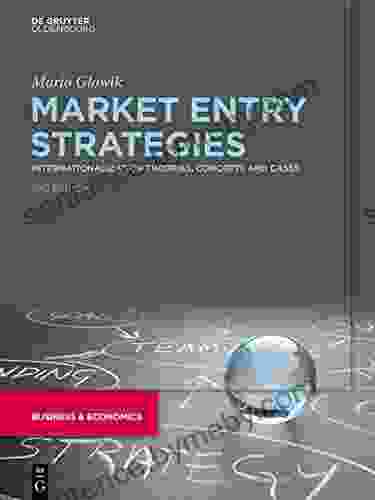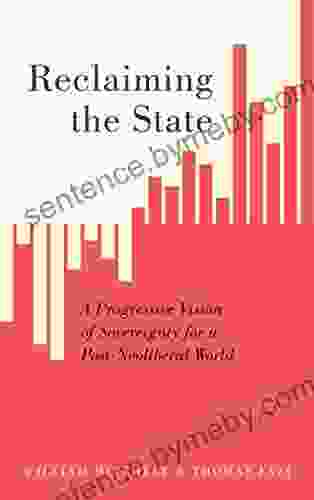A Progressive Vision of Sovereignty for a Post-Neoliberal World

The concept of sovereignty has been central to international relations theory and practice for centuries. Traditionally, sovereignty has been understood as the supreme authority of a nation-state within its territory. This understanding of sovereignty has been challenged in recent decades by globalization, which has led to a decline in the power of the nation-state and an increase in the power of non-state actors.
In this book, I argue that the traditional concept of sovereignty is no longer adequate to address the challenges of the 21st century. I develop a progressive vision of sovereignty that is based on the principles of democracy, human rights, and environmental protection. I argue that this vision of sovereignty is necessary to create a more just and sustainable world.
The challenges of the 21st century are complex and interconnected. They include:
4.5 out of 5
| Language | : | English |
| File size | : | 655 KB |
| Text-to-Speech | : | Enabled |
| Screen Reader | : | Supported |
| Enhanced typesetting | : | Enabled |
| Word Wise | : | Enabled |
| Print length | : | 310 pages |
- Globalization: Globalization has led to a decline in the power of the nation-state and an increase in the power of non-state actors. This has made it more difficult for states to address global problems such as climate change, poverty, and inequality.
- Climate change: Climate change is one of the most pressing challenges facing humanity today. It is caused by the burning of fossil fuels, which releases greenhouse gases into the atmosphere. Greenhouse gases trap heat, causing the planet to warm. Climate change is having a devastating impact on the environment, including:
- Rising sea levels
- More extreme weather events
- Changes in plant and animal life
- Poverty and inequality: Poverty and inequality are major problems in many parts of the world. Poverty is defined as living on less than $1.90 per day. Inequality is defined as the gap between the rich and the poor. Poverty and inequality are often caused by:
- Lack of access to education and healthcare
- Discrimination
- Political instability
The traditional concept of sovereignty is based on the idea of the nation-state as the ultimate authority within its territory. This concept of sovereignty was developed in the 17th century, when the nation-state was the dominant form of political organization.
The traditional concept of sovereignty has several key features:
- Territoriality: Sovereignty is based on the idea that a nation-state has exclusive authority over its territory. This means that no other state or actor can interfere in the affairs of a state within its territory.
- Exclusivity: Sovereignty is exclusive. This means that a state has the sole authority to make laws, enforce laws, and adjudicate disputes within its territory.
- Internal autonomy: Sovereignty is internal. This means that a state has the right to govern itself without interference from other states or actors.
Globalization has challenged the traditional concept of sovereignty in several ways. First, globalization has led to a decline in the power of the nation-state. This is because globalization has increased the interdependence of states. States are now more reliant on each other for trade, investment, and security. This interdependence has made it more difficult for states to act unilaterally.
Second, globalization has led to an increase in the power of non-state actors. Non-state actors include corporations, international organizations, and non-governmental organizations (NGOs). These actors have become more powerful because they are able to operate across bFree Downloads. This has made it more difficult for states to control the activities of non-state actors within their territory.
Climate change has also challenged the traditional concept of sovereignty. Climate change is a global problem that cannot be solved by individual states acting alone. This is because climate change is caused by the collective actions of all states. In Free Download to address climate change, states need to cooperate with each other.
Poverty and inequality are also challenges to the traditional concept of sovereignty. Poverty and inequality are often caused by global factors, such as the international trade system. This means that states cannot solve poverty and inequality on their own. In Free Download to address poverty and inequality, states need to cooperate with each other.
I argue that the traditional concept of sovereignty is no longer adequate to address the challenges of the 21st century. I develop a progressive vision of sovereignty that is based on the principles of democracy, human rights, and environmental protection.
My vision of sovereignty is based on the idea that sovereignty is not absolute. Sovereignty is limited by the rights of individuals and the need to protect the environment. I argue that states have a responsibility to protect the rights of their citizens and to protect the environment.
My vision of sovereignty also emphasizes the importance of international cooperation. I argue that states need to cooperate with each other in Free Download to address global problems such as climate change, poverty, and inequality.
A progressive vision of sovereignty has several benefits. First, it would help to create a more just world. A progressive vision of sovereignty would ensure that the rights of individuals are protected and that the environment is protected.
Second, a progressive vision of sovereignty would help to create a more sustainable world. A progressive vision of sovereignty would ensure that states cooperate with each other to address global problems such as climate change.
Third, a progressive vision of sovereignty would help to create a more peaceful world. A progressive vision of sovereignty would reduce the likelihood of conflict between states.
The traditional concept of sovereignty is no longer adequate to address the challenges of the 21st century. I develop a progressive vision of sovereignty that is based on the principles of democracy, human rights, and environmental protection. I argue that this vision of sovereignty is necessary to create a more just, sustainable, and peaceful world.
4.5 out of 5
| Language | : | English |
| File size | : | 655 KB |
| Text-to-Speech | : | Enabled |
| Screen Reader | : | Supported |
| Enhanced typesetting | : | Enabled |
| Word Wise | : | Enabled |
| Print length | : | 310 pages |
Do you want to contribute by writing guest posts on this blog?
Please contact us and send us a resume of previous articles that you have written.
 Book
Book Novel
Novel Page
Page Chapter
Chapter Text
Text Story
Story Genre
Genre Reader
Reader Library
Library Paperback
Paperback E-book
E-book Magazine
Magazine Newspaper
Newspaper Paragraph
Paragraph Sentence
Sentence Bookmark
Bookmark Shelf
Shelf Glossary
Glossary Bibliography
Bibliography Foreword
Foreword Preface
Preface Synopsis
Synopsis Annotation
Annotation Footnote
Footnote Manuscript
Manuscript Scroll
Scroll Codex
Codex Tome
Tome Bestseller
Bestseller Classics
Classics Library card
Library card Narrative
Narrative Biography
Biography Autobiography
Autobiography Memoir
Memoir Reference
Reference Encyclopedia
Encyclopedia John Mandel
John Mandel Lisa Shawver
Lisa Shawver Judith Mckay
Judith Mckay James Fenimore Cooper
James Fenimore Cooper Nicholas Harvey
Nicholas Harvey Jay Asher
Jay Asher Paul Schullery
Paul Schullery Joseph Lanza
Joseph Lanza Mary Ann Anderson
Mary Ann Anderson Rachelle Doorley
Rachelle Doorley James Spooner
James Spooner Jamie L B Deenihan
Jamie L B Deenihan L T Ryan
L T Ryan Jan Gaye
Jan Gaye Mariko Higaki
Mariko Higaki Maureen Corrigan
Maureen Corrigan Sara Blakely
Sara Blakely Roderick Stewart
Roderick Stewart Mike Johnston
Mike Johnston Jay Atkinson
Jay Atkinson
Light bulbAdvertise smarter! Our strategic ad space ensures maximum exposure. Reserve your spot today!

 Jeffrey Cox20 Alfabeti Brevemente Illustrati Da Raffaello Bertieri: A Visual Feast for...
Jeffrey Cox20 Alfabeti Brevemente Illustrati Da Raffaello Bertieri: A Visual Feast for...
 Holden BellThe Deaths of Seneca James Ker: A Journey Through Life, Death, and the Human...
Holden BellThe Deaths of Seneca James Ker: A Journey Through Life, Death, and the Human... Edmund HayesSir Robert Falconer Biography Heritage: A Beacon of Education and Inspiration
Edmund HayesSir Robert Falconer Biography Heritage: A Beacon of Education and Inspiration Herbert CoxFollow ·7.4k
Herbert CoxFollow ·7.4k Esteban CoxFollow ·12.3k
Esteban CoxFollow ·12.3k Diego BlairFollow ·9.1k
Diego BlairFollow ·9.1k Damon HayesFollow ·2.4k
Damon HayesFollow ·2.4k Ernest HemingwayFollow ·11.4k
Ernest HemingwayFollow ·11.4k Corbin PowellFollow ·14.7k
Corbin PowellFollow ·14.7k Gabriel Garcia MarquezFollow ·15.7k
Gabriel Garcia MarquezFollow ·15.7k Lee SimmonsFollow ·3.2k
Lee SimmonsFollow ·3.2k

 Franklin Bell
Franklin BellHow Businesses Can Thrive In The New Global Neighborhoods
The world is becoming...

 Rob Foster
Rob FosterCard Manipulations Volume 1: A Masterclass in Deception...
Unveiling the...

 Enrique Blair
Enrique BlairUnveil the Secrets of Card Manipulation: Dive into "More...
Step into the captivating world...

 Jamal Blair
Jamal BlairComedy Fillers 200 Quips One Liners Jean Hugard
Unlock the Secrets of...

 Chase Simmons
Chase SimmonsUnlock Financial Independence: A Comprehensive Guide to...
In a world where financial security seems...

 Dion Reed
Dion ReedUnveiling Global Market Entry Strategies: A Comprehensive...
Global Market Entry Strategies:...
4.5 out of 5
| Language | : | English |
| File size | : | 655 KB |
| Text-to-Speech | : | Enabled |
| Screen Reader | : | Supported |
| Enhanced typesetting | : | Enabled |
| Word Wise | : | Enabled |
| Print length | : | 310 pages |






